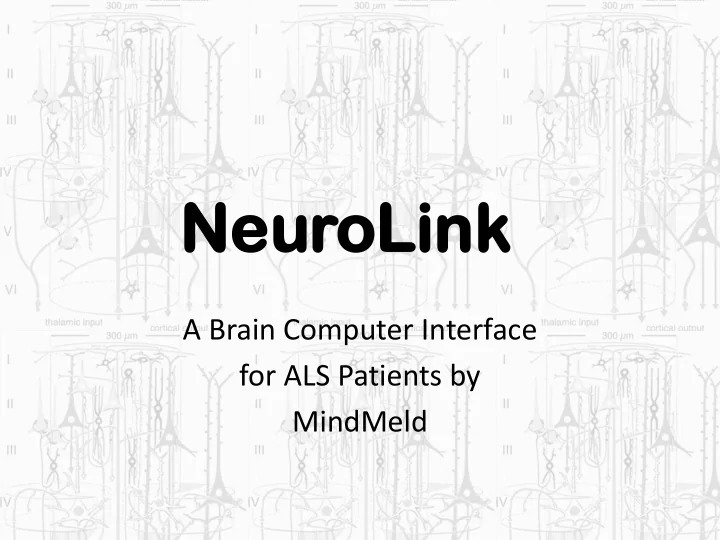

Neu NeuroLink A Brain Computer Interface for ALS Patients by MindMeld
Team MindMeld • Andrew Black – Algorithmic Magician – Computer Science, BSMS program • Matthew Bodofsky – Packaging Specialist – Information Technology, Bachelor's Degree • Ken Fox, CISSP, CSSLP –Team Lead, Design – Computer Science, Math Minor, Bachelor's Degree • Eric Loi -- Development Manager – Computer Science, Bachelor's Degree
Stakeholders • Sara Feldman – Drexel College of Medicine – Philadelphia PA. • Jeff Salvage – Drexel College of Computing and Informatics – Philadelphia PA • EPICS provided funding for Muse & EyeTribe • Dr. Greg Hislop - Advisor
NeuroLink • Two aspects to NeuroLink – Computer accessibility system for the immobile • ALS patients – Research system/platform to • Integrate or develop new sensor devices • Evaluate new signal processing methods
ALS • Amyotrophic Lateral Sclerosis – Lou Gehrig’s Disease – Motor Neurons in Brain & Spinal cord degenerate – Eventual loss of all voluntary Muscle control: • Walking, speech, facial muscles • Senses still work – Always fatal, no cure, limited mitigations • Need a way to communicate with the world – Family – Care providers (Doctors, Nurses, Therapists, etc)
Existing Assistive Technologies Tobii PCEye $3.5K Eyegaze Edge Talker $10K intendiX Speller $17.5K
Challenges • EyeTribe eye-tracker finally arrives – Technology Evaluation Report – Can we use it? – Wait, can’t download the SDK? – Not so open source, no direct access to eye position data – Resolution/accuracy – Steep minimum hardware requirements • Muse Changes their API • EEG state classification – Alpha, Beta, Theta waves a dead end – Switch to processing raw EEG data • Weather…
Modular Staged Architecture Above – From our design documents Below – From our Testing documents
Stages • Device • Manufacturer I/O (drivers, utilities, tools, SDK) • Input Signal Processor (ISP) • Recognizer-Translator (RT) • Common Result Representation (CRR) • Application
Demonstration The Work in Progress
Summary • Help people with Neuro Degenerative Diseases • Use inexpensive (relatively) technology • Support multiple input devices • Support multiple targets (systems/applications) • Modular/flexible processing – Supports change – Supports research
Questions
THANK YOU
Recommend
More recommend